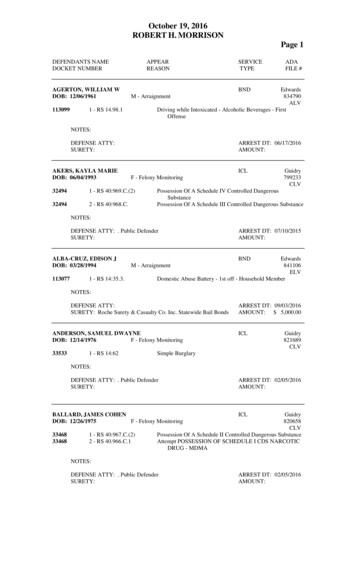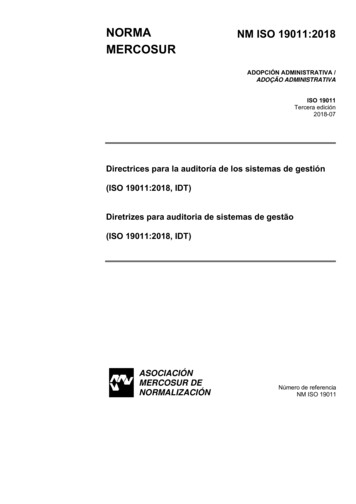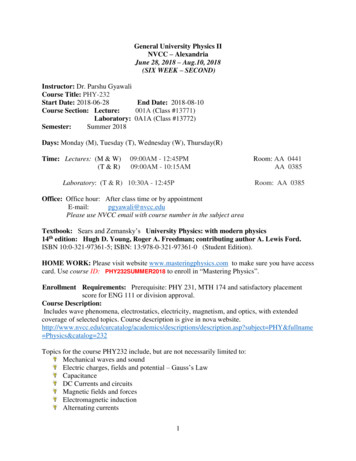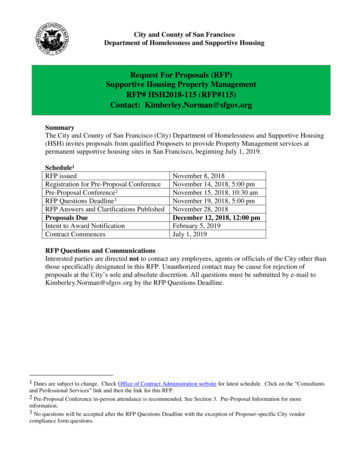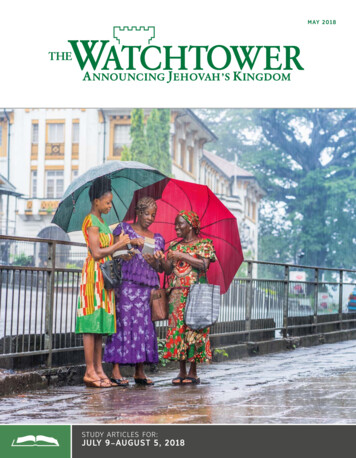
Transcription
MAY 2 0 1834567STUDY ARTICLES FOR:JULY 9 –AUGUST 5, 2018
COVER IMAGE:PUBLISHERSSIERRA LEONE2,171Two pioneers offer a tract to a passerbyin the capital, Freetown, during thecountry’s long rainy seasonBIBLE STUDIES5,291MEMORIAL ATTENDANCE ( 2017)8,831TABLE OF CONTENTS3LIFE STORYA Poor Start—A Rich Ending922WEEK OF JULY 23-2927WEEK OF JULY 30–AUGUST 5Peace—How Can You Find It?1217Jehovah Loves Those Who“Bear Fruit With Endurance”WEEK OF JULY 16-22The first of these two articles considers Jesus’parables of the vine and of the sower and explainswhat they teach us about our preaching work. Thesecond article examines several Scriptural reasonsthat motivate us to carry out the preaching workwith endurance.This publication is notfor sale. It is providedas part of a worldwideBible educational worksupported by voluntarydonations.To make a donation,please visit www.jw.org.3234567 Unless otherwiseindicated, Scripturequotations are fromthe modern-languageNew World Translationof the Holy Scriptures.Young Ones—Stand FirmAgainst the DevilSatan is our enemy. What is the extent of hisinfluence? What are the limits of his power?And how can all of us, including young Christians,resist him? These two articles will answer thosequestions and will help us strengthen our resolveto stand firm against the Devil.WEEK OF JULY 9-15Why We “Keep Bearing Much Fruit”Know Your EnemyAn Abundant Harvest!May 2018Vol. 139, No. 7 ENGLISHThe Watchtower (ISSN 0043-1087) Issue 7 May 2018 is published by Watchtower Bible and Tract Society of New York, Inc.; L. Weaver, Jr., President; G. F. Simonis, Secretary-Treasurer; 1000 Red Mills Road, Wallkill,NY 12589-3299, and by Watch Tower Bible and Tract Society of Canada,PO Box 4100, Georgetown, ON L7G 4Y4. 5 2018 Watch Tower Bible and TractSociety of Pennsylvania. Printed in Canada.
LIFE STORYA Poor Start—A Rich EndingAS TOLD BYSAMUEL F. HERDI was born in a one-room log cabinin a very small town called Liberty,Indiana, U.S.A. My parents alreadyhad three children when I came along—my older brother and two sisters.Later, my mother gave birth tomy two younger brothers and myyounger sister.I was one of seven children,and I learned a lot about farmingas a youthDURING my school years, not much changed. Inmy school, the people you were with in first gradewere the same ones you finished school with; infact, you knew the names of most people in town,and they knew yours.The town of Liberty was surrounded by smallfarms, and the basic crop was corn. When I wasborn, my father was working for one of the localfarmers. As a teenager, I learned to drive a tractor and became familiar with other basic farmingskills.I never knew a young father. My father was56 years old when I was born; my mother was35. Nevertheless, my father was a lean, healthy,strong man who loved hard work and taught all ofus kids to value it as well. He never made muchmoney, but he kept a roof over our heads, clotheson our backs, and food in our stomachs—and hewas always there for us. He was 93 years old whenhe died. My mother died at the age of 86. Neitherof them served Jehovah. Of my siblings, I haveone brother who has served faithfully as an eldersince that arrangement began back in the early1970’s.The log cabin where I was born3
MY EARLY YEARSMy mother was very religious. She took us tothe Baptist church every Sunday. When I was 12,I first heard about the Trinity. Curious, I asked mymom: “How can Jesus be both the Son and the Father at the same time?” I remember her answer:“Son, it’s a mystery. We’re not meant to understand it.” It certainly was a mystery to me. Still,when I was about 14, I got baptized in a localcreek—dipped three times for the Trinity!While I was in high school, I had a friend whowas a prizefighter, and he convinced me to tryboxing. So I started training, and I enrolled in theGolden Gloves, a boxing organization. I wasn’tvery good, so after a few bouts, I gave it up. Later, I was drafted into the U.S. Army and sent toGermany. While I was serving there, my superiorssent me to a Noncommissioned Officers Academy, thinking that I had natural leadership abilities. They wanted me to make the military mycareer. I had no desire to stay in the military service, so after finishing my service time of twoyears, I was honorably discharged in 1956. Beforetoo long, though, I enrolled in a very differentarmy.A NEW LIFE BEGINSUp to this point in my life, I had learned to besomewhat macho. The idea of what a man shouldbe like, as presented in the movies and the socialenvironment, influenced me a great deal. Tomy way of thinking, preachers were not manlyenough. But I began to learn some things thatturned my life around. One day, while I was driving my red convertible through town, two youngwomen waved me over. I knew them—they werethe younger sisters of the man who had marriedmy older sister. Anyway, these two girls were Jehovah’s Witnesses. I had accepted the Watchtowerand Awake! magazines from them before, but Igenerally felt that The Watchtower was a bit toodeep for my taste. This time, however, they invited me to come to a Congregation Book Study, a4THE WATCHTOWER1954-1956I spent two yearsin the U.S. Army1952At age 17,before I wasdrafted intothe armysmall meeting for Bible study and discussion thatwas held in their home. I told them I would thinkabout it. “Do you promise?” the smiling girlsasked me. “I promise,” I said.I had some regrets about making that promise,but I felt that I could not back out. So that nightI went. The children impressed me the most. Icouldn’t believe how much they knew about theBible! After all those Sundays of churchgoingwith my mother, I still had very little Bible knowledge. Now I was determined to learn more. Iagreed to a Bible study. I learned early on that thepersonal name of God Almighty is Jehovah. Yearsbefore, when I asked my mother about Jehovah’sWitnesses, she simply said, “Oh, they worshipsome old man named Jehovah.” But I now feltthat my eyes were being opened!I made rapid progress, for I knew that I hadfound the truth. Within nine months of that firstmeeting, I got baptized—in March of 1957. Myoutlook on life changed. When I think about myold macho attitude, I am glad that I learned whatthe Bible teaches about real manliness. Jesus was
a perfect man. He had strength and physical power that would make any ‘macho man’ pale in comparison. Yet, he did not get involved in fights, but“he let himself be afflicted,” just as was foretold.(Isa. 53:2, 7) I learned that a true follower of Jesus “needs to be gentle toward all.”—2 Tim. 2:24.I started pioneering the next year, in 1958.Soon, though, I had to stop for a short time. Why?I had decided to take a bride—Gloria, one ofthose two young ladies who had invited me to thebook study! I have never regretted that decision.Gloria was a jewel then, and she is a jewel today.To me, she is like the Hope Diamond—but I don’thave to hope in this case. I married her! Let hertell you a bit about herself:“I was one of 17 children. My mom was a faithful Witness. She died when I was 14. That waswhen my dad began studying. With Mom gone,Dad made an arrangement with the school principal. My older sister was then a senior in highschool, and Dad asked if she and I could go toschool on alternate days. We would take turns sothat one of us could be at home to take care ofthe younger children and have dinner ready forthe family by the time Dad came home fromwork. The school principal approved, and that arrangement lasted until my sister graduated. TwoWitness families studied with us, and 11 of us children grew up to be Jehovah’s Witnesses. I enjoyed field service, even though I have alwaysstruggled with shyness. Sam has helped me withthat over the years.”Gloria and I got married in February of 1959.We enjoyed pioneering together. In July of thatyear, we applied for Bethel service, for we longedto serve at world headquarters. A dear brother,Simon Kraker, interviewed us. He told us thatBethel was not accepting married couples at thattime. We never lost that desire to serve at Bethel—but it proved to be a long time in coming!We wrote to world headquarters, asking to besent to serve where the need was greater. In response, we were given just one choice: Pine Bluff,Arkansas. In those days, there were two congregations in Pine Bluff—one white and one “colored,” or black. We were sent to the “colored”congregation, which had only about 14 publishers.COPING WITH SEGREGATION AND RACISMYou may be wondering why segregation wouldbe practiced in congregations of Jehovah’s Witnesses. And the answer, put simply, is that therewas little choice back in those days. There werelaws in place to make it illegal for the races tomix, and there was also the very real threat of violence. In many places, the brothers had goodreason to fear that if the two races met togetherfor worship, their Kingdom Hall would be destroyed. Such things did happen. If black Witnesses preached from door to door in a whiteneighborhood, they would be arrested—and likely beaten up. So in order to get the preachingwork done, we obeyed the laws, hoping thatthings would change for the better.Our ministry had its challenges. While we wereworking a black territory, we sometimes inadvertently knocked at a door of a white family. We hadto determine quickly if we should try to give ashort Scriptural presentation or just acknowledgeour mistake and move on. In some places, thatwas how things were in those days.Of course, we had to work hard secularly tosupport our pioneering. Most of our jobs paidthree dollars a day. Gloria had a few housekeeping jobs. I was permitted to help her at one placeso that she could get done in half the time. Wewere given lunch—a frozen prepackaged mealcalled a TV dinner that Gloria and I shared beforeleaving. Each week, Gloria did ironing for onefamily. I did yard work, washed windows, andcared for other odd jobs. In the home of onewhite family, we washed the windows—Gloria didit from the inside, and I did it from the outside.It took all day, so we were given lunch. Gloria ateinside the house but separate from the family,MAY 20185
I cherish the helpI received fromfaithful spiritualbrothersJames A.Thompson, Jr.while I ate outside in the garage. I didn’t mind. Itwas a very good meal. The family was nice; theywere just locked into that system, that way ofthinking. I remember one time when we stoppedat a gas station. After filling up the tank of ourcar, I asked the attendant if Gloria could use therestroom. He just glared at me and said, “It’slocked.”MEMORABLE ACTS OF KINDNESSOn the other hand, we had wonderful timeswith the brothers, and we loved our ministry!When we first arrived in Pine Bluff, we moved inwith the brother who was the congregation servant at the time. His wife was then an unbeliever,and Gloria started a Bible study with her. Meanwhile, I started a study with the couple’s daughter and her husband. Mother and daughter bothdecided to serve Jehovah and got baptized.We had dear friends in the white congregation.They would have us over for dinner, but they hadto do so under the cover of darkness. The Ku KluxKlan (KKK), an organization that promotes racism and violence, was very active then. I remember seeing a man sitting on his front porch oneHalloween night proudly wearing a white sheetand hood, as those in the KKK did. That kind ofthing, though, did not stop the brothers fromshowing kindness. One summer, we needed fundsin order to travel to the convention, and a broth6THE WATCHTOWERJ.R.BrownFredRusker agreed to buy our 1950 Ford in order to makeit possible. One day, a month later, we were tiredafter walking from door to door in the summerheat and conducting Bible studies. Then we camehome to a surprise. There was our car, parked infront of the house! A note on the windshield read:“You can have your car back as a gift from me.Your brother.”Another act of kindness made a lasting impression on me. In 1962, I was invited to attend theKingdom Ministry School at South Lansing, NewYork. It was a full month of training for thosewith oversight of the congregations, circuits, anddistricts. When I got the invitation, though, I wasunemployed and struggling financially. However,a telephone company in Pine Bluff had interviewed me for a job. If they hired me, I would bethe first black man to work for that company.They finally told me that they were going to hireme. What would I do? I had no money to travel toNew York. I seriously thought about taking thejob and turning down the invitation to the school.In fact, I was getting ready to write a letter declining the invitation when something happened thatI will never forget.A sister in our congregation, whose husbandwas an unbeliever, knocked on our door early onemorning and handed me an envelope. It was fullof money. She and several of her young childrenhad been getting up very early in the morning to
go out in the fields and chop cotton—removingthe weeds growing between the rows—in order toearn enough money so that I could take the tripto New York. She said, “Go to school and learn asmuch as you can, and come back and teach us!”Later, I asked the telephone company if I couldstart working there five weeks later than planned.The answer was an emphatic, “No!” But it didn’tmatter. I had made my decision. I am so glad thatI did not take that job!Here is how Gloria remembers our time in PineBluff: “I fell in love with the territory! I had 15 to20 Bible studies. So we would go in the house-tohouse work in the morning and then conduct Bible studies the rest of the day, sometimes until11 o’clock at night. Service was so much fun! Iwould happily have stayed in that work. I have toadmit that I did not really want to change my assignment and enter the circuit work, but Jehovahhad something else in mind.” He certainly did.LIFE IN THE TRAVELING WORKWhile we were pioneering in Pine Bluff, we applied to become special pioneers. We had highhopes because our district overseer wanted us tohelp a congregation down in Texas, and he wanted us to go there as specials. The thought of suchSince 1999,I have been privilegedto serve on theGoverning Bodya change appealed to us. So we waited and waited, hoping for an answer from the Society, but wekept finding the mailbox empty. Finally, a lettercame one day—we were assigned to the traveling work! That was January 1965. Brother LeonWeaver, now the coordinator of the United StatesBranch Committee, was appointed to serve as acircuit overseer at the same time.I was nervous about becoming a circuit overseer. A year or so earlier, the district overseer,James A. Thompson, Jr., examined my qualifications. He kindly showed me a few areas in whichI could improve, mentioning skills that a good circuit overseer needs. I had been in the circuit workfor only a short time when I realized that hiscounsel was surely needed. After I was appointed, Brother Thompson was the first district overseer I served with. I learned a lot from that faithful spiritual brother.In those days, a circuit overseer received littletraining. I spent a week observing a circuit overseer as he visited one congregation. Then hespent the following week observing me as I visited another congregation. He offered suggestionsand guidance. But after that we were on our own.I remember saying to Gloria, “Does he reallyhave to leave now?” In time, though, I realized
A RICH ENDINGGloria was a jewel when I married her,and she still issomething important. There will always be goodbrothers who can help you—if you let them helpyou. I still cherish the help I received from suchexperienced brothers as J. R. Brown, then a traveling overseer, and Fred Rusk of the Bethel family.Racism ran high in those days. One time, theKKK held a march in a town we were visiting inTennessee. I remember another time when theservice group stopped for a break at a fast-foodrestaurant. I went to use the men’s restroom, andI noticed that a very rough-looking character, tattooed like a white supremacist, got up and followed me. But a white brother, far larger than either me or the rough-looking customer, came inafter us. “Is everything all right, Brother Herd?”he asked me. The other customer left quicklywithout using the facilities. Over the years, I haveseen that prejudice is not really about a person’sskin; it is about sin—the Adamic sin that infects usall. And I have learned that a brother is a brother regardless of skin color, and he will die for youif need be.8THE WATCHTOWERWe spent 33 years in the traveling work, the last21 of those in the district work. They were rich,rewarding years, full of encouraging experiences.Another reward was on the way, though. In August 1997 our long-standing dream was realized.We were invited to serve at the United StatesBethel—some 38 years after the first time we applied. The following month, we began our Bethelservice. I assumed that the responsible brothersat Bethel only wanted me to help out temporarily, but that is not how things turned out.I was first assigned to work in the Service Department. That was a learning experience. Thebrothers there have to deal with many sensitiveand complex questions from elder bodies and circuit overseers around the country. I appreciatedhow patient and helpful the brothers were in training me. Nonetheless, I feel that if I were assignedto work there again, I would still be a novice.Gloria and I love Bethel life. We have alwaysbeen early risers, and that habit certainly helps atBethel. After a year or so, I began serving as ahelper to the Service Committee of the Governing Body of Jehovah’s Witnesses. Then in 1999, Iwas appointed to be a member of the GoverningBody. I have learned many things in this assignment, but the foremost lesson has been how obvious it is that Jesus Christ—not any man—is thehead of the Christian congregation.Looking back on my life, I sometimes feel a bitlike the prophet Amos. Jehovah took note of thathumble shepherd who engaged in menial seasonal work as a nipper of sycamore figs—food considered fit only for the poor. God appointed Amosto be a prophet, certainly a spiritually rich assignment. (Amos 7:14, 15, ftn.) Similarly, Jehovahtook note of me, the son of a poor farmer in Liberty, Indiana, and poured out rich blessings onme—too many even to mention! (Prov. 10:22) Icertainly feel that my life may have had a poorstart materially, but the ending is spiritually rich,far richer than I could ever have imagined!
PEACELOVEJOYPEACEPATIENCEKINDNESSHow Can You Find It?GOODNESSFAITHMILDNESSSELF-CONTROLBECAUSE we live in a troubled world, wemust work hard to gain peace. Yet, evenwhen we have a measure of peace, we oftenstruggle to keep it. What does God’s Wordsay that can help us to find true and lasting peace? And how may we help others todo so?WHAT IS NEEDED FORTRUE PEACE?In order to enjoy real peace, we must feelsafe and have a sense of well-being. We alsoneed to develop strong friendships with others. Most important, to find lasting peace,we must cultivate a close friendship withGod. How can we do that?When we obey Jehovah’s righteous commands and principles, we show that wetrust in him and that we desire to have apeaceful relationship with him. (Jer. 17:7, 8;Jas. 2:22, 23) In turn, he draws close tous and blesses us with inner peace. Isaiah32:17 says: “The result of true righteousness will be peace, and the fruitage of truerighteousness will be lasting tranquillity andsecurity.” We can find true inner peace byobeying Jehovah from the heart.—Isa. 48:18, 19.We are also helped to develop lastingpeace by means of a remarkable gift fromour heavenly Father—his holy spirit.—Acts9:31.GOD’S SPIRIT HELPS USDEVELOP PEACEThe apostle Paul lists peace as the thirdaspect of “the fruitage of the spirit.” (Gal.5:22, 23) Since true peace is produced byGod’s spirit, we must yield to the influenceof the holy spirit to develop true peace. Letus consider two ways in which God’s spiritcan help us find peace.Anxieties of liferob many of peaceMAY 20189
First, we are helped to develop peace byreading God’s inspired Word regularly. (Ps.1:2, 3) As we meditate on the Bible’s message, God’s spirit helps us to understandJehovah’s thinking on many matters. For example, we see how he remains peaceableand why peace is so important to him. Whenwe apply such lessons from God’s Word,we experience greater peace in our lives.—Prov. 3:1, 2.Second, we must pray for God’s holy spirit. (Luke 11:13) Jehovah promises that if weseek his help, “the peace of God that surpasses all understanding will guard [our]hearts and [our] mental powers by meansof Christ Jesus.” (Phil. 4:6, 7) When weprayerfully rely on Jehovah’s spirit, our Godfills us with an inner peace that belongsonly to those who have a precious friendship with him.—Rom. 15:13.How have some applied this Scripturalcounsel and made needed changes thatallowed them to experience lasting peace—with Jehovah, with themselves, and withfellow humans?HOW THEY FOUND LASTING PEACEIn the Christian congregation today aresome who were once “prone to anger” butwho are now more thoughtful, kind, patient,and peaceable in their dealings with others.1 (Prov. 29:22) Notice how this was trueof two Kingdom publishers who were helpedto overcome anger and to cultivate peacewith others.David’s bad attitude affected his speech.Before dedicating his life to God, he was often critical of others and used harsh language with his family. In time, David sawthe need to change and become peaceable.How did he find peace? He says, “I beganapplying Bible principles in my life, and as aresult, the respect between me and my family grew.”Rachel’s background influenced her attitude. She admits, “Even now, I struggle withfeelings of anger because I was brought upin an angry household.” What has helped1 The quality of kindness will be considered in a futurearticle in this series on the fruitage of God’s holy spirit.Applying Bible principlesand praying for God’s spiritwill help us to find peace10THE WATCHTOWER
her to become more peaceable? She answers, “Prayerful reliance on Jehovah.”David and Rachel are just two examplesof the peaceful fruitage that results whenwe apply inspired Scriptural principles andrely on God’s spirit to help us. Clearly, despite living in a hostile world, we can haveinner peace that contributes to harmonywithin our families and with fellow Christians. Yet, Jehovah urges us to “be peaceable with all men.” (Rom. 12:18) Is that really possible, and what benefits come fromour efforts to make peace?PURSUE PEACE WITH OTHERSBy means of our field ministry, we invitepeople to benefit from our peaceful message about the Kingdom of God. (Isa. 9:6, 7;Matt. 24:14) Happily, many have responded.As a result, they are no longer overwhelmedwith feelings of despair or anger over whatthey see happening around them. Instead,they now have a real hope for the futureand are moved to “seek peace and pursueit.”—Ps. 34:14.Not all, however, respond favorably toour message, at least not initially. (John 3:19) Even so, we are assisted by God’s spirit to present the good news to them in apeaceful and respectful manner. In this way,we follow Jesus’ instructions for the ministry recorded at Matthew 10:11-13, where headvised: “When you enter the house, greetthe household. If the house is deserving, letthe peace you wish it come upon it; but if itis not deserving, let the peace from you return upon you.” When we follow Jesus’ advice, we can leave with our peace intact andwith the possibility of helping the person inthe future.We also contribute to peace when we approach government officials in a respectfulway—including those who may oppose ourwork. For example, the government of oneAfrican country allowed prejudice to prevent it from granting approval for the building of Kingdom Halls. In hopes of resolvingthe matter peacefully, a brother who hadpreviously served as a missionary in that African land was assigned to visit the country’s High Commissioner in London, England. He was to tell the official about thepeaceful work of Jehovah’s Witnesses in hiscountry. How did that visit turn out?“When I arrived at the reception desk,”he relates, “I concluded by the receptionist’s manner of dress that she belonged to atribe whose language I had learned. So Igreeted her in her own tongue. Taken bysurprise, she asked me, ‘What is the reason for your visit?’ I politely told her that Iwished to see the High Commissioner. Shetelephoned the official, who came out tomeet me and greeted me in the local language. After that, he carefully listened tome as I explained to him the peaceful activities of the Witnesses.”The brother’s respectful explanation removed much of the commissioner’s misunderstanding and prejudice toward ourwork. Some time later, the government ofthat African country lifted its building restrictions. How the brothers rejoiced at thatpeaceful outcome! Indeed, treating otherswith respect yields many fine benefits—including peace.ENJOY PEACE FOREVERToday, Jehovah’s people enjoy a spiritualparadise that is filled with peace. You willadd to that peace as you work to developthis aspect of the spirit’s fruitage in yourlife. Most important, you will gain Jehovah’sapproval and find abundant and everlasting peace in God’s new world.—2 Pet. 3:13, 14.
Jehovah LovesThose Who “Bear FruitWith Endurance”“As for that on the fine soil, these are the ones who . . .bear fruit with endurance.”—LUKE 8:15.SONGS: 68, 72CAN YOU EXPLAIN?Why may we feel discouragedwhen preaching in less responsive territories?Why can all of us have a fruitful ministry?What will help us to keepbearing fruit with endurance?12SERGIO AND OLINDA are a pioneer couple in their 80’s wholive in the United States. Lately, their sore legs make movingabout more difficult. Still, as they have done for decades, inthe morning they walk to a square in a busy section of town,arriving there at seven o’clock. They take their place near abus stop and offer our Bible literature to passersby. Most people ignore them, but the couple remain in their spot, smilingat those who look at them. At noon, they slowly walk home.The next morning, at seven o’clock, they are back in thesquare. In fact, this faithful couple are busy preaching theKingdom message there six mornings a week, year-round.2 Like Sergio and Olinda, many faithful brothers and sisters around the world have been preaching for decades inunresponsive home territories. If that challenge describes1, 2. (a) Why are we encouraged by those who faithfully preach in unresponsive territories? (See opening picture.) (b) What did Jesus sayabout preaching in his “home territory”? (See footnote.)
your situation, we warmly commend youfor your endurance.1 Your steadfastness in serving Jehovah is a source ofencouragement for many—even for experienced fellow believers. Note theseexpressions made by circuit overseers:“When I work with such faithful brothers and sisters in the ministry, I feel energized by their example.” “Their faithfulness encourages me to persevere andto be courageous in my own ministry.”“Their example warms my heart.”3 To strengthen our resolve to complete the preaching work that Jesusassigned us, let us consider the answers to three questions: Why may we attimes feel discouraged? How can we bearfruit? What will help us to keep bearingfruit with endurance?WHY MAY WE FEEL DISCOURAGED?If you have ever felt discouragedwhen preaching in less responsive territories, you will relate to the apostle Paul.During his approximately 30-year-longministry, he helped numerous individuals to become disciples of Christ. (Acts14:21; 2 Cor. 3:2, 3) Still, he did not succeed in moving many Jews to becometrue worshippers. On the contrary, mostrebuffed Paul, and some even persecuted him. (Acts 14:19; 17:1, 4, 5, 13) Howdid that adverse reaction from the Jewsaffect Paul? He freely admitted: “I amtelling the truth in Christ . . . I have4great grief and unceasing pain in myheart.” (Rom. 9:1-3) Why did Paul experience such feelings? His heart was inthe preaching work. He preached to theJews out of deep concern for them. So itpained Paul to see them reject God’smercy.5 Like Paul, we preach to people out ofheartfelt concern. (Matt. 22:39; 1 Cor.11:1) Why? We know from our own experience how many blessings await thosewho decide to serve Jehovah. When wethink about the individuals in our territory, we tell ourselves, ‘If only we couldhelp them to see what they are missingout on!’ Therefore, we keep encouragingthem to learn the truth about Jehovahand his purpose for mankind. In effect,we say to those to whom we preach: ‘Webrought a beautiful gift for you. Pleaseaccept it.’ So when people refuse to accept that gift, it is no wonder that we mayhave “pain in [our] heart.” Such feelingsindicate, not that we lack faith, but thatour heart is in the preaching work. So despite moments of discouragement, we endure. Elena, a pioneer for over 25 years,speaks for many of us when she says: “Ifind the preaching work difficult. Still,there is no other work I would rather do.”HOW CAN WE BEAR FRUIT?1 Even Jesus recognized that preaching in his“home territory” was a challenge—a fact recordedby all four Gospel writers.—Matt. 13:57; Mark 6:4;Luke 4:24; John 4:44.Why can we be sure that regardlessof where we preach, we can have a fruitful ministry? To answer that importantquestion, let us examine two of Jesus’ illustrations in which he considers theneed to “bear fruit.” (Matt. 13:23) Thefirst one is about a vine.3. What three questions will we consider, andwhy?4. (a) How did the negative reaction frommost Jews affect Paul? (b) Why did Paul experience such feelings?5. (a) What moves us to preach to our neighbors? (b) Why is it no wonder that we at timesfeel discouraged?6. What question will we consider, and how willwe do so?6MAY 201813
Read John 15:1-5, 8. Note that Jesustold his apostles: “My Father is glorifiedin this, that you keep bearing much fruitand prove yourselves my disciples.” Jesusdescribed Jehovah as “the cultivator,”himself as “the true vine,” and his d
A Poor Start—A Rich Ending AS TOLD BY SAMUELF. HERD I w as bor nin o e-room log cabin in a very small town called Liberty, Indiana, U.S.A. My parents already had three children when I came along —my ol d erb th an tw sist s. Later, my mother gave birth to my two younger bro

